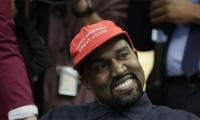MONTREAL, Canada: The World Anti-Doping Agency (WADA) faces a challenge to tackle cheating in sport while it has an annual budget of less than the income of many top athletes, its president Craig Reedie said.
Lack of money could equally prove a handicap for a proposed independent testing authority, said Reedie, who also expressed support for global athletics chief Sebastian Coe and said WADA was in a state of “peace, not war” with Coe’s troubled sport.
“I could do with a lot more money,” Reedie said in an interview with Newsweek published on Saturday.
The Scot said governments decided their own contributions to WADA’s budget, which were then matched by the International Olympic Committee (IOC).
“The total is not nearly enough,” he said.
WADA’s total annual budget of $30 million a year is exceeded by many athletes around the world who make more than that themselves in one year.
Reedie said he was impressed with the support within sport and from governments for an independent testing agency as proposed by IOC president Thomas Bach but the question of funding needed to be addressed.
“Who pays the bill is a crucial question. This is one of the challenges as we investigate a new independent body that would remove the conflict of interest inherent with international federations who promote and police their sports,” he said.
“An independent testing body may or may not be a priority for governments, who see that their own domestic anti-doping programmes are just as important,” he added.
Reedie said cycling was one sport that had successfully addressed the issue.
“I suspect the most successful body at the moment is the International Cycling Union which clearly had problems, not specifically in any one country. But it has now decided to separate the testing and the handling of doping matters to an independent body” he said.
Former WADA president Dick Pound said last month that the IAAF, governing body of world athletics, needed to be completely restructured because of “corruption embedded in the organisation” under former president Lamine Diack.
Russia was banned from athletics after an independent commission for WADA revealed widespread, state-sponsored doping in the country.
Reedie said the IAAF had handled the situation “in a reasonable manner” and that WADA maintained “an ongoing relationship with the IAAF as it carries out its normal anti-doping duties”. “WADA’s job is to protect clean athletes, so it’s a case of peace, not war,” he added.
Spain's Rafael Nadal. — AFP File PARIS: Former world number one Rafael Nadal is unlikely to be seeded at next...
French President Emmanuel Macron shoots to score a goal from the penalty spot in the Varieties Club charity football...
Juventus and Milan face off in fight for second place. — AFP FileMILAN: Juventus v AC Milan is traditionally one of...
Mohsin Naqvi during a meeting in this picture on November 12, 2023. — X/@GovtofPunjabPK LAHORE: In response to the...
The Pakistan Cricket Board chairman Mohsin Naqvi on Thursday held a meeting with the New Zealand Cricket Chief...
Pakistan Women's Cricket team skipper Bismah Maroof. — AFP/FileKARACHI: The former Pakistan Women’s skipper Bismah...







